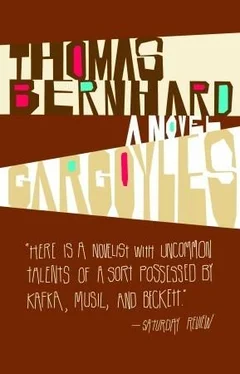The prince said: “We are without parents. We are orphans. That is our condition, and we shall not, Europe will not escape from this condition ever again. The question has always been, how can I expand, how solidify Hochgobernitz even more. Never before has Hochgobernitz been so utterly cut off from the world and simultaneously so dependent on the world. I am always afraid of earthquakes. It is no longer possible for me to walk without thinking about earthquakes, feeling earthquakes, future earthquakes, noises, underground noises, and at the same time noises inside my head. I have the idea,” the prince said, “that we are writing letters, sending letters, and receiving letters, and that the signatures on all these letters are illegible. Who writes all these sent and received letters? I see how the catastrophe is shaping up; looking out of the window I see it shaping up noiselessly, taking place noiselessly. I am not allowed to speak of it. But the fact that I occupy the smallest room in vast Hochgobernitz is uncanny, Doctor. This room, moreover, is the dampest and coldest. Suppose I were to write an essay in my room, I think, a study bearing the simple title My Room , into which I would squeeze the entire world. I would squeeze the entire room into my room and into my study. No, not a study,” the prince said. “The thinking man’s task is more and more to remove images from his memory. His goal has been attained when there is no longer a single image in his brain. When the representational potentialities of his brain are exhausted. I bear no guilt,” he said. “I often tell myself, I know I bear no guilt. Guilt? For decades I tried to communicate; as long as I have been alive nothing but the attempt to communicate has consumed me. At first I started trying to communicate with my parents, my sisters, my children. I wanted to communicate with everybody. Now I am trying to communicate with you, and with your son. Actually,” the prince said, “these September nights can already be very cold. The cold comes up from below, from the gorge. It is usually ice cold here. Hochgobernitz is made of ice. People frozen into ice in Hochgobernitz. The times in which we live obviously are poor for furthering communication. At first,” the prince said, “my mother thought of me as a crime against herself, later as a crime she had committed. Then I became a nuisance to her. Then she began to despise me, then to love me, to hate me, because she always felt forced to identify with me. For the parents, children are an incurable tumor which deforms them for life. I withdraw more and more into my room as a sickroom. I have always taken everything I have in this room, the food, the reading, the thinking, as if it were medicine, emotional fluids, intellectual liquids, tablets of philosophy. Being incurable is a condition that has lasted ten years. I have been conscious of this condition for that long — a nondenominational disease inherited by right of succession,” the prince said. “You see, Doctor, I am putting on my jacket, and I am taking my jacket off again. I bought this jacket in Brussels, that one in London, that one in Cairo. I am putting on the Cairo jacket, taking off the London jacket, putting on the Brussels jacket, taking off the Cairo jacket. Curiosity, which costs so much money,” the prince said. “Naturally I cannot leave Hochgobernitz. I always bought newspapers and without reading them, merely leafing through them, threw them away again not a hundred paces away from the newsstand where I bought them. If I were to let the newspapers I have bought in my life blow down Kärntnerstrasse as a newspaper drift, a newspaper drift like a snowdrift, Kärntnerstrasse would be completely stuffed up in no time at all; everything in Kärntnerstrasse would be smothered, half of Vienna would be smothered; people would be smothered under the newspapers I have bought in my life, could be buried and smothered; a deadly newspaper winter would descend on Vienna. I see,” the prince said, “the fever of childhood in the faces of children. Childhood tires quickly; age is the recollection of childhood. Best of all to be in bed and be able to fall asleep — for a long time now that has been all I want or need. Have you properly made use of your body? I think. Of your mind? Of life? When you begin to worry about that, you’re already past it-Foolish statements,” the prince said. “On railroad platforms, often, I am struck by the notion of throwing myself under the train at the last moment, but in big city toilets I find I am still curious after all. Pleasure in inventing complicated, impeccable sentences. Grasping the meaning of the word ethometer . Grasping the helplessness of all people, but without pity. The necessity of letting everything you know freeze hard. Challenging the steward who dismissed five gravel pit workers,” the prince said. “I ask: Why? He does not answer me. I say the gravel pit workers are not to be dismissed; it is dangerous to dismiss even a single gravel pit worker. We must not dismiss any of them, I say, but the steward dismisses the five. Instantly I feel something sinister about the gravel pits.… Or,” the prince said, “I walk on the outer wall, right here where we are walking now, and pick up a chestnut leaf. The chestnut leaf reminds me of my mother; as I look at it I see her. Its smell reminds me of Measure for Measure . I see Measure for Measure. Measure for Measure reminds me of a pair of old shoes I wore as a child, and so on.… We see a person and instantly pass judgment,” the prince said. “This is a clever person, we say, a stupid person, a rabid person, a happy person, a cultivated, foolish, sociable, always laughing, always hopeless, always businesslike, always vulgar, always pitiable person … and we understand nothing. If we say, he is a catastrophic person , without knowing him, if we say, he is dead, and so on.… We see in a person frailties which at once make us see the frailties of the community in which we live, the frailties of all communities, the state; we feel them, we see through them, we catastrophize them. The greater the capacity for judgment, the greater the wariness. Our wariness slowly permeates everything. Even as a child my father toyed with the thought of killing himself. It cost him the greatest self-control, whenever he crossed the Ache, not to throw himself into the Ache. To hang himself. To shoot himself. This thought dominated him. Thinking in possibilities of suicide as a learned discipline subordinate to science,” the prince said. “The mystical element in my thinking has almost been switched off. Isolation. Nothing has purpose,” he said. “The millions of experiments,” he said, “lead back to the source, if we look at them with open eyes. These experiments in the mass and in so-called untrammeled nature. Nothing is easier than to escape into the commonplace. I say something,” the prince said, “and I immediately perceive the opposite of it in myself. We can persuade ourselves that we are not alone with a book, as we can persuade ourselves that we are not alone with a person. When we hire an actor, we want to be entertained; we blast him if he forgets that. We always live in the delusion (because we think it will enable us to live) that we can escape completely from at least one of the elements of nature, that for example we are able to make a revolution, to topple a king from his pinnacle, and so on.… The eye is often abandoned by the intellect, the intellect by the eye. Nowadays,” the prince said, “we feel at ease in biblical descriptions; we have discovered the poetry of Sodom and Gomorrah and feel it. We are no longer fearful unto death, we go to death. Illnesses lead man by the shortest path to himself. Of course we must demand precision at least in our first premises. A man without a brain would be thoughtless. Our teachers have been enemies of our intellects. What does not concern us vexes us. For a long time now I have been concerned not with the idea of who will be on the moon tomorrow, but who will be the first to travel through the earth . The complete conversational incapacity of my wife, who could be sentimental about the whole world in regard to any single thing. Fatal diseases spreading everywhere. Always thinking in comparisons between the upper, my , and the lower, their , rooms. Habits, tendencies that have slowly consumed us all. Our impoverishment in action. In the lower rooms philosophy is no more possible than mysticism in the upper rooms. Sometimes I hear all the clocks in the house so loudly that I must get up and stop them. That requires several hours. Then I can fall asleep. Formerly, as children, we knocked on the walls to communicate with one another. Now nobody has knocked on the walls for half a century. In no time at all Hochgobernitz will be tenanted by the beetles and spiders,” the prince said. “Beetles and spiders as nature’s craziness, I often think. Everything is mystification,” he said.
Читать дальше












